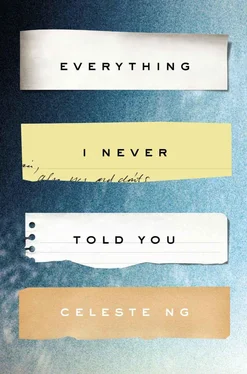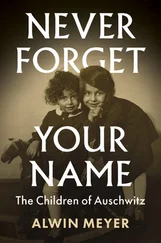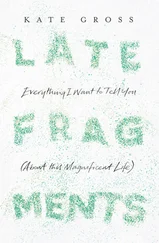“Bullshit,” Jack said. “Then how come whenever Mr. Kelly hands back an assignment, you look like you’re going to cry?”
She hadn’t realized it was so obvious, and a hot flush flared in her cheeks and trickled down her neck. Beneath her, the seat creaked and a spring prodded her thigh, like a knuckle.
“Little Miss Lee, smoking,” Jack said, clucking his tongue. “Won’t your brother be upset when he finds out?”
“Not as upset as he’d be to find out I was in your car.” Lydia grinned. Jack didn’t seem to notice. He rolled down the window and a cold rush of air burst into the car as he flicked his cigarette butt into the street.
“Hates me that much, does he?”
“Come on,” Lydia said. “Everybody knows what happens in this car.”
Abruptly, Jack pulled to the side of the road. They had just reached the lake, and his eyes were cold and still, like the iced-over water behind him. “Maybe you’d better get out, then. You don’t want someone like me corrupting you. Ruining your chances of getting into Harvard like your brother.”
He must really hate Nath, Lydia thought. As much as Nath hates him. She imagined them in class together all these years: Nath sitting close to the front, notebook out, one hand rubbing the little furrow between his eyebrows, the way he did when he was thinking hard. Utterly focused, oblivious to everything else, the answer right there, sealed inside his mouth. And Jack? Jack would be sprawled in the back corner, shirt untucked, one leg stretched into the aisle. So comfortable. So certain of himself. Not worried about what anyone thought. No wonder they couldn’t stand each other.
“I’m not like him, you know,” she said.
Jack studied her for a long moment, as if trying to decide if this were true. Beneath the backseat, the engine idled with a growl. The ash at the end of her cigarette lengthened, like a gray worm, but she said nothing, just breathed a thin cloud of fog into the frozen air and forced herself to meet Jack’s narrowing gaze.
“How did you get blue eyes?” he said at last. “When you’re Chinese and all?”
Lydia blinked. “My mom’s American.”
“I thought brown eyes won out.” Jack propped his hand against her headrest and leaned in to study her carefully, like a jeweler with a gemstone. Under this appraisal, the back of Lydia’s neck tingled, and she turned away and ashed her cigarette into the tray.
“Not always, I guess.”
“I’ve never seen a Chinese person with blue eyes.”
Up close, she could see a constellation of freckles on Jack’s cheek, faded now, but still there. As her brother had long ago, Lydia counted them: nine.
“You know you’re the only girl in this school who’s not white?”
“Yeah? I didn’t realize.” This was a lie. Even with blue eyes, she could not pretend she blended in.
“You and Nath, you’re practically the only Chinese people in the whole of Middlewood, I bet.”
“Probably.”
Jack settled back into his seat and rubbed at a small dent in the plastic of the steering wheel. Then, after a moment, he said, “What’s that like?”
“What’s it like?” Lydia hesitated. Sometimes you almost forgot: that you didn’t look like everyone else. In homeroom or at the drugstore or at the supermarket, you listened to morning announcements or dropped off a roll of film or picked out a carton of eggs and felt like just another someone in the crowd. Sometimes you didn’t think about it at all. And then sometimes you noticed the girl across the aisle watching, the pharmacist watching, the checkout boy watching, and you saw yourself reflected in their stares: incongruous. Catching the eye like a hook. Every time you saw yourself from the outside, the way other people saw you, you remembered all over again. You saw it in the sign at the Peking Express — a cartoon man with a coolie hat, slant eyes, buckteeth, and chopsticks. You saw it in the little boys on the playground, stretching their eyes to slits with their fingers— Chinese — Japanese — look at these— and in the older boys who muttered ching chong ching chong ching as they passed you on the street, just loud enough for you to hear. You saw it when waitresses and policemen and bus drivers spoke slowly to you, in simple words, as if you might not understand. You saw it in photos, yours the only black head of hair in the scene, as if you’d been cut out and pasted in. You thought: Wait, what’s she doing there? And then you remembered that she was you. You kept your head down and thought about school, or space, or the future, and tried to forget about it. And you did, until it happened again.
“I dunno,” she said. “People decide what you’re like before they even get to know you.” She eyed him, suddenly fierce. “Kind of like you did with me. They think they know all about you. Except you’re never who they think you are.”
Jack stayed silent for a long time, staring down at the castle in the center of the steering wheel. They would never be friends now. He hated Nath, and after what she’d just said, he would hate her, too. He would kick her out of the car and drive away. Then, to Lydia’s surprise, Jack pulled the pack of cigarettes from his pocket and held it out. A peace offering.
Lydia did not wonder where they would go. She did not think, then, about what excuse she’d offer her mother, the excuse that — with an inspired smirk — would be her cover for all her afternoons with Jack: that she’d stayed after school to do physics extra credit. She did not even think about Nath’s shocked and anxious face when he learned where she had been. Looking out over the lake, she could not know that in three months she would be at its bottom. At that moment she simply took the proffered cigarette and, as Jack flicked the lighter, touched its tip to the flame.
James is all too familiar with this kind of forgetting. From Lloyd Academy to Harvard to Middlewood, he has felt it every day — that short-lived lull, then the sharp nudge to the ribs that reminded you that you didn’t belong. It seemed a false comfort to him, like a zoo animal crouched in its cage, ignoring the gawking eyes, pretending it is still running wild. Now, a month after Lydia’s funeral, he treasures those moments of forgetting.
Others might have found refuge in a pint of whiskey, or a bottle of vodka, or a six-pack of beer. James, though, has never liked the taste of alcohol, and he finds it does not dull his mind; it only turns him a dark beet-red, as if he has endured some terrible battering, while his mind races all the faster. He takes long drives, crisscrossing Middlewood, following the highway almost to Cleveland before turning back. He takes sleeping pills from the drugstore, and even in his dreams, Lydia is dead. Again and again, he finds only one place where he can stop thinking: Louisa’s bed.
He tells Marilyn that he’s going in to class, or to meet with students; on weekends, he says he has papers to grade. These are lies. The dean had canceled his summer class the week after Lydia’s death. “Take some time for yourself, James,” he had said, touching James gently on the shoulder. He did this with everyone he needed to soothe: students enraged over low grades, faculty slighted by the grants they did not receive. His job was to make losses feel smaller. But the students never turned their C-minuses into Bs; new funding never materialized. You never got what you wanted; you just learned to get by without it. And the last thing James wants is time for himself — being at home is unbearable. At every moment, he expects Lydia to appear in the doorway, or to hear the squeak of her floorboards overhead. One morning, he heard footsteps in her room, and before he could stop himself, he ran upstairs, breathless, only to find Marilyn pacing before Lydia’s desk, opening and closing her desk drawers. Get out, he wanted to shout, as if this were a sacred space. Now, every morning, he picks up his briefcase, as if he is going to teach, and drives in to the college. Even in his office, he finds himself mesmerized by the family photo on his desk, where Lydia — barely fifteen, then — peers out, ready to leap through the frame’s glass and leave everyone behind. By afternoon, he finds himself at Louisa’s apartment, plunging into her arms, then between her legs, where, blessedly, his mind shuts off.
Читать дальше












